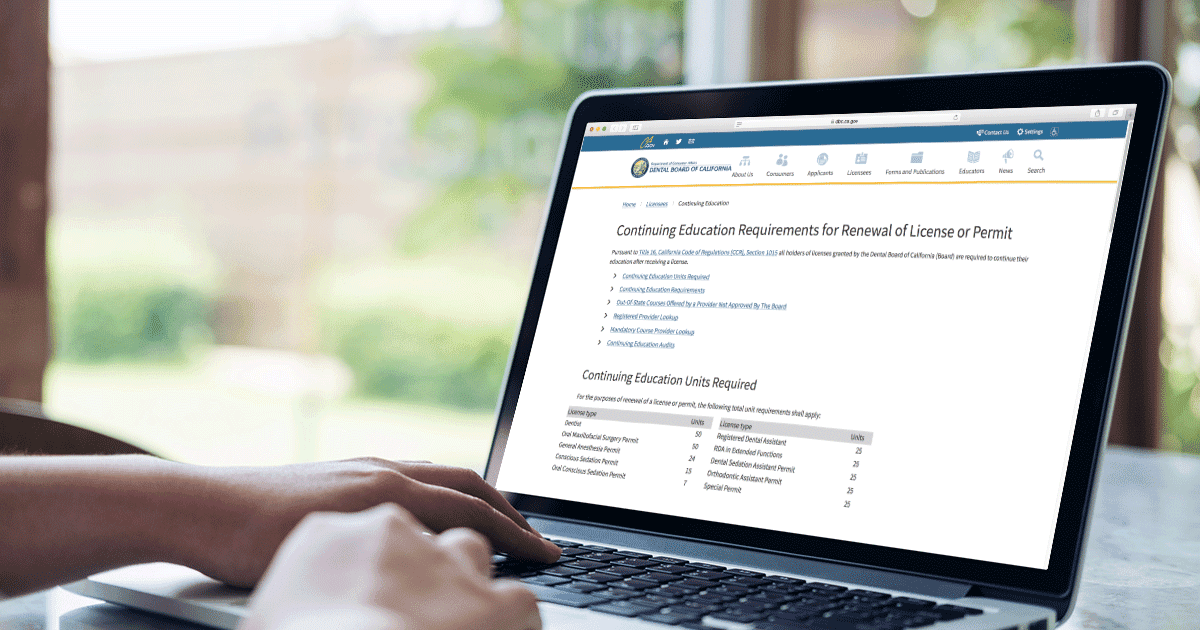Article updated May 11, 2023, to include information about the course on opioid-prescribing, which is a condition of license renewal for active dentists as of Jan. 1, 2023, and to note an additional approved provider of the basic life support course.
March 9, 2020: Dental board licensees are required to maintain their continuing education certificates for up to three renewal periods (six years). But if you’re a licensee and you receive a C.E. audit in the mail, what happens next?
C.E. audits are done on a randomized basis and are not punitive. The dental board audits 1% of the active licensing population each year, which equates to approximately 30 licensees per month, including dentists and dental assistants. Of those 30 licensees, at least one must hold a general anesthesia, conscious sedation, oral conscious sedation, dental sedation assistant or orthodontic assistant permit.
While the chances of receiving a C.E. audit are fairly low, it is important that licensees always keep their mailing addresses updated in BreEZe ― the Department of Consumer Affairs’ online licensing and enforcement system. That way, in the event the dental board sends a request for you to submit proof of C.E. completion (or any other correspondence, including renewal notices), you are able to respond in a timely manner.
Common C.E. deficiencies
Using compiled data from the past several years, the dental board has identified the following most common deficiencies as revealed through C.E. audits:
- Licensee did not complete the minimum required units for renewal. (See C.E. unit requirements.)
- Licensee did not complete a mandatory C.E. course (Basic Life Support, California Infection Control, California Dental Practice Act and, effective January 2023, a board-approved course on opioid-prescribing).
- Licensee failed to take a mandatory C.E. course from an entity approved to provide mandatory courses in California.
- The BLS course must be provided by a CERP or PACE provider or by the American Heart Association, American Red Cross or, as of January 2023, the American Safety and Health Institute.
- IC and CDPA course providers must be preapproved by the dental board to provide those courses. You can determine if your C.E. course provider is approved by using the BreEZe license search tool.
C.E. audits are an effective way to ensure that dental board licensees are staying up to date on infection control standards, current laws and regulations and proper emergency life-saving techniques. The dental board states that, “by requiring proof of compliance in continued education from the licensees, the Board is helping to ensure safety for the consumers and emphasizing the importance of educating dental professionals.”
If you are an employer, it is also important to remember any C.E. requirements that your employees may have. For example, unlicensed dental assistants must complete, one time only, a 2-hour California Dental Practice Act course and an 8-hour California Infection Control course. Dentist employers are responsible for ensuring any unlicensed dental assistant employed beyond 120 days provides evidence of course completion for the two required courses within 12 months of the date of hire. Dentist employers must also ensure that their dental assistant employees maintain basic life support certification.
One requirement that is sometimes identified during a C.E. audit or the licensure renewal process is the pit and fissure sealant requirement for RDAs. A licensed RDA who has not completed a qualifying program or board-approved course prior to initial licensure must do so before their first licensure renewal. Dentist employers should be asking new RDA hires about the status of their pit and fissure sealant requirement upon hiring to prevent an unexpected lapse in their license from occurring.
Additionally, when choosing which C.E. course to take, it is important to remember that the education a licensee is receiving does not necessarily enable them to perform the services within that course and, in some cases, may not qualify for C.E. credit. For example, a course related to the provision of elective facial cosmetic surgery would not enable the licensee to perform such services unless the attendee has an EFCS permit (see 16 CCR 1016(b)(4)(F)). Licensees should evaluate C.E. courses for their educational value and are always responsible to know the scope of their license and permits.
Discover opportunities to earn C.E. units: Contact your local dental society, see the schedule of courses at the next CDA Presents convention, check out CDA's live and on-demand courses or browse CDA's affiliate course calendar.

